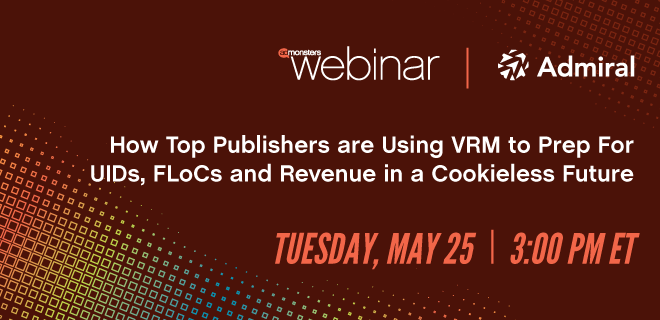
For the past 18+ months, the digital publishing and advertising industries have been in a holding pattern, waiting for a definitive resolution on how a multi-billion dollar ecosystem will ultimately move forward into a future without third-party cookies.
The conundrum itself, and its implications, have been discussed ad nauseum over countless webinars and conferences by some of the best and brightest our industry has to offer, and despite all efforts, it feels like we’re still waiting for that silver bullet solution to materialize to hitch our collective wagons to. However, while we wait, there are critical actions already being taken by leading publishers to ensure they’re well prepared for the cookieless future.
Some of Admiral’s top clients and partners have gone all-in on the idea that regardless of whether the future of monetization rests in Google’s cohort-based targeting solution FLoC, or a cabal of UID players, one thing is certain, Relationships = Revenue. From registration walls to unlocking adblock users, to diversifying revenue with subscriptions, there are clear-cut steps that publishers can take now to collect first-party data and build relationships in preparation for the future.
In the following Q&A, we talked about these topics with Dan Rua, CEO of Admiral: The Visitor Relationship Management Company. We’ll go more in-depth on these topics during an upcoming roundtable discussion —How Top Publishers are Using VRM to Prep for UIDs, FLoCs and Revenue in a Cookieless Future — with top publishers at 3 pm ET Tuesday, May 25, 2021. (Register now, it’s free!)
AdMonsters: Admiral has been preaching the benefits of strengthening the relationship between publishers and their visitors for years, and now it seems like the entire industry has adopted this mantra. How does Admiral and its Visitor Relationship Management (VRM) Platform fit into the solution set for publishers as they prepare to navigate a cookieless future?
Dan Rua: It’s all about relationships, relationships, relationships, relationships. I feel like Steve Ballmer’s meme, when Microsoft went all-in on “developers, developers, developers, developers.” The massive privacy and user-empowerment wave that is disrupting publisher business models is only growing larger and “Death of the Cookie” is just its latest manifestation.
Publishers are scrambling to figure out if UIDs, FLoCs, or some other adtech trick will save their jobs in a cookieless future, but the one constant is that stronger first-party visitor relationships will always trump weaker visitor relationships.
As such, Visitor Relationship Management (VRM) is an approach that doesn’t rely upon guessing adtech winners and losers but instead doubles down on your most unique and valuable asset — your visitors. Those visitors are people, not statistics or eyeballs, so treat them like people. Just like with real-life friends, visitor relationships start small, with an intro and some discourse to grow trust with each other.
What does that visitor relationship journey look like for a publisher using a VRM platform? Well, it could start with an engagement to say “Hi!” and offer three days of ad-free content in exchange for an email address. On a future visit, that could lead to an engagement saying “Hello again…” and offer seven days of ad-free experience in exchange for account registration. Once an authenticated account has been created, future visits can lead to more engagements that collect more first-party data, offering more value exchanges, including social follows, donations, adblock recovery, subscriptions, and more. Beyond first-party data goals, digital subscription revenue is booming right now as a diversifying hedge against an uncertain future.
Of particular note, VRM isn’t just another acronym for adtech. In fact, it’s a completely different beast from adtech…more akin to martech unicorns outside of media publishing, like HubSpot, Drift, and more. That’s one reason we sometimes say Admiral is like “Hubspot+Drift for Media Publishers.” After decades of publishers investing and re-investing in adtech, more adtech isn’t going to get the industry out of the mess it’s created. Instead, growing great relationships requires a new, visitor-first martech mindset and adops/revops/revenue leaders are in the perfect position to lead a “Relationship Revolution” aligning their entire organization with VRM.
AdMonsters: Why are registration walls and email acquisition (decidedly “old” topics) now mission-critical for publishers?
DR: Registration walls (or regwalls) have quickly become the first action publishers should take to prepare for post-cookie Universal IDs (UIDs). During the first quarter of 2021, publishers have been inundated with webinars, whitepapers and more, touting a mix of UID options, including LiveRamp, TheTradeDesk/UID2, ID5, BritePool, LiveIntent, and a dozen others. The UID options for publishers and advertisers are dizzying, and yet it’s unclear whether to try picking winners or prepare for them all. This is made worse by the fact that ROI for UID efforts today is unclear.
This has led publishers to ask “What is the best use of my time and effort for the remainder of 2021, to prepare for post-cookie UIDs in 2022?” The answer is “Launch and hone your regwall strategy now…full stop.”
Emails, accounts and logged-in users will be the lifeblood of most post-cookie UIDs — plus they hold value separate from UIDs.
Emails, accounts and logged-in users will be the lifeblood of most post-cookie UIDs — plus they hold value separate from UIDs. That means that growing relationships with your visitors in 2021, resulting in a million new emails or accounts, will deliver ROI no matter what happens for UIDs in 2022. However, regwalls aren’t just about coding a brute-force popup. Doing it well, without a ton of dev work or alienating visitors, requires a one-tag platform built specifically to grow relationships — like Admiral’s VRM.
After installing a single tag, publishers can create multi-step regwalls that deliver the right ask, to the right visitor, at the right time — all with zero coding required. They can also target journeys based upon a mix of criteria, providing a different journey to search visitors, social visitors, EU visitors, casual visitors, loyal visitors, and more. The end result is intelligent regwalls, growing emails, accounts and logged-in users, every single day.
Lastly, I’d be remiss if I didn’t mention how critical consent will become for UIDs and how regwalls can help. Publishers who already have thousands of emails for their newsletters may feel like they have a good foundation for future post-cookie UIDs, but privacy consent expectations are changing rapidly — making their old emails damaged goods for UID purposes.
Visitors who provided an email for newsletter purposes may not be OK with that email being used for personalized ads on your site — and advertisers are already asking this question. Some demand-side UID participants want proactive consent for any email/account-based UIDs, not just passive consent buried in a privacy policy. Therefore, the best regwall strategies will also include a plan for UID consent and visitor journeys that can gather proactive consent automatically. Admiral’s regwall and privacy consent experts can help publishers do UID consent right from the start.
AdMonsters: There’s been some chatter about blockers disrupting Google’s competing solution to UIDs, called FLoC (Federated Learning of Cohorts). Given that adblock recovery is one piece of Admiral’s VRM platform, what’s going on with this surge in blocker activity and how can publishers respond in 2021 to maximize potential FLoC revenue in 2022?
DR: First, it’s worth remembering that adblock growth was really the first shock to the system that has now led to tracking blockers, GDPR/CCPA and Death of the Cookie. Although publishers have jumped from crisis to crisis over the years, adblock losses are still in the billions industry-wide and recent crises are all part of the same privacy and user-empowerment wave reshaping the Internet’s core business model.
It’s another reason why Admiral focuses on visitor relationships so much. We’ve had great success recovering adblock losses for thousands of publishers like ViacomCBS, NBCUniversal, Hearst, and more by growing visitor relationships in a consent-based way — instead of relying on some adtech trick or paying off the blockers. Top tier publishers talk to their visitors, grow first-party relationships/data and iterate on the value exchange; and will continue to separate themselves from publishers that hide behind adtech tricks until their demise.
As it relates to FLoC, there isn’t a ton most publishers can do right now to test FLoC and optimize for it. It’s coming, and most industry experts predict industry RPMs will be lower as a result — which means publisher revenue will be lower unless you do something about it.
We’ve found that consent-based adblock recovery delivers RPMs that are 10X better than paying the blockers to inject ads and the dialogue with visitors about value exchange opens the door to further relationship growth.
Luckily, publishers can prepare for the drop in RPMs by unlocking more pageviews in 2021, so they’re better prepared for FLoC, 2022, and beyond. One key way to do that is via consent-based adblock recovery, unlocking new FLoC’able pageviews. We’ve found that consent-based adblock recovery delivers RPMs that are 10X better than paying the blockers to inject ads and the dialogue with visitors about value exchange opens the door to further relationship growth.
Now that EFF (checkout their Am I FLoCed tool), DuckDuckGo, AdGuard, EyeO, Brave, have all announced plans to block FLoC and more, it’s more important than ever to double down on consent-based relationships. If you hope to benefit from FLoC in 2022, then 2021 is the year to maximize the number of visitors you have allowing FLoC.
Given the blocks mentioned above, that means engaging users in a respectful way so they can make choices about supporting the publishers they love. Admiral even has some special Journeys and offers to help publishers prepare for FLoC, and they can be launched in 5 minutes, with no coding required. Interested publishers can email me directly [email protected] to learn more.
To learn more about this topic, don’t forget to register for our webinar roundtable discussion —How Top Publishers are Using VRM to Prep for UIDs, FLoCs and Revenue in a Cookieless Future — with top publishers at 3 pm ET Tuesday, May 25, 2021. (Register now, it’s free!)
